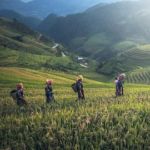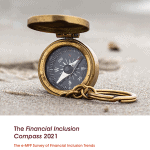How Decentralized Business Models Can Serve India’s Rural Communities During – and After – COVID-19
In service of efficiency, companies around the world have long sought to streamline their operations into fewer but larger centralized manufacturing centers. Yet despite its advantages, some argue against this kind of centralization.
McKinsey calls this a “timeless tug-of-war” in business: Centralizing too much can limit a company’s ability to innovate or tailor products and services to local markets. But not centralizing enough can deny companies the efficiency and economies of scale they need to compete at a global level.
Decentralizing Proves Valuable during COVID-19
The twin economic and health crises of COVID-19 are putting social enterprises everywhere through an extreme stress test, both in terms of their ability to pivot to meet the emergency needs of their customers and to withstand the crisis themselves. Traditional manufacturing models that relied on centralized production in cities, and long-distance, last-mile distribution have proven untenable in the context of pandemic-related shutdowns. In response, some social enterprises have decentralized their models to better serve rural, low-income communities — focusing instead on local production and distribution.
Now, as the post-COVID-19 period approaches, presenting both new challenges and new opportunities, Acumen has observed that decentralized business models are proving to be vital support systems for these underserved communities. Rural business specialists Root Capital and Last Mile Health have also found that pre-existing platforms serving hard-to-reach communities provide an “infrastructure ready to be mobilized in times of crisis.” These platforms are agile models whose decentralized nature brings them closer to the last mile, allowing them to better identify and adapt to the needs of these communities.
From Manufacturing Sanitary Napkins to Facemasks
For example, Acumen India fellow Suhani Mohan founded Saral Designs in 2015 to offer affordable, high-quality menstrual pads to the 80 million-plus Indian women who lack access to them. Mohan and her team developed the world’s first fully automatic machine that produces low-cost, high-quality pads specifically designed for a decentralized model, and put these machines in the hands of local manufacturers.
Studying the value chain of the sanitary napkins market, Mohan found that she could reach more target customers by decentralizing Saral Designs’ entire model — from distributed manufacturing with small, efficient machines to last-mile distribution, and even to the company’s branding and advertising efforts. She decided to empower local partners and franchises to run the whole operation using their reach and resources: These local manufacturing units can even create their own brands, if they have the confidence and the marketing/sales capacity to do so. Saral Designs’ role is to equip them with materials, selected sourcing partners, machines to manufacture and pack the pads, and distribution infrastructure.
As India faced a shortage of protective facemasks to prevent the spread of COVID-19, Saral Designs repurposed its distributed manufacturing model, using its small-scale menstrual pad machines to create protective facemasks for rural communities. In a short time, the company was able to create a model for getting masks to hard-to-reach, vulnerable populations across the country. To support these kinds of efforts, Acumen launched a Global Emergency Facility to support our network of Acumen fellows like Mohan, along with our portfolio companies, in serving low-income communities during the pandemic.
Saving Rotting Vegetables and Sustaining Farmers’ Livelihoods
Acumen India investee S4S Technologies also operates a decentralized model — but in agricultural processing.
The company supplies rural women with a small machine that uses solar energy to dry local farmers’ vegetables and spices. S4S then transports the dried produce to a centralized facility for packaging and sale to large food companies.
The vegetables S4S buys for local drying are those that traditional produce buyers have rejected solely because of the way they look — even though the nutrient value is the same. By turning this rejected produce into profits, S4S is increasing smallholder farmers’ incomes by up to 15%, and employing hundreds of rural women dryers.
COVID-19 has hampered delivery logistics in India, especially in the fresh vegetable supply chain, given that the country lacks cold storage facilities for produce while in transit. S4S’ model of drying produce at the farm gate has proven to be an ideal option for preserving produce that would otherwise rot — and sustaining farmers’ livelihoods.
With their decentralized production models, Saral Designs and S4S Technologies were both able to quickly address new challenges brought on by COVID-19. As the crisis continues — and hopefully approaches its end — existing decentralized service channels have become lifelines for serving remote and vulnerable communities in India and other emerging markets. Now that they’ve shown their impact potential, the crucial challenge turns to scale: How might we create more locally based, interdependent production models? Could such business models ultimately signal a future in which a more equitable and sustainable business ecosystem operates — and delivers the majority of its impact — at a local level?
**
Learn more about how Acumen, our investees and our fellows are standing with the poor through the COVID-19 crisis.
Mahesh Yagnaraman is India Country Director at Acumen, where he oversees and leads investing, business development and Acumen Academy for India. He recently co-authored a paper entitled, Impact Investing – An Assessment and Proposal for Reforms.
Photo courtesy of Trinity Care Foundation.
- Categories
- Coronavirus, Social Enterprise





